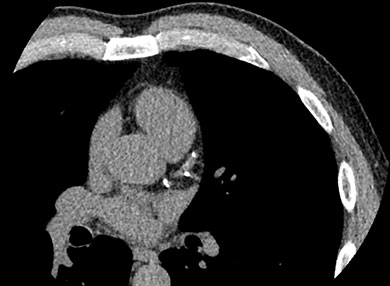Information about your coronary CT calcium score
The coronary CT calcium score test is a non-invasive CT scan that measures the amount of calcified plaque (calcium) in your coronary arteries. It is used to calculate your risk of coronary artery disease, heart attack, or stroke.

For doctors, the Coronary CT Calcium Score test not only helps clarify the risk for heart disease, its decreasing cost means it will be more readily used in cardiovascular diagnoses.
The coronary CT Calcium score test makes use of special x-ray technology to scan and produce multiple images of the coronary arteries for plaque deposits and check if they are blocked by the buildup of plaque, which is a sign of coronary artery disease.
This helps doctors evaluate your risk for a heart attack. Since plaque takes up calcium, it can light up and can be detected in a heart and CT scan, which otherwise cannot be measured non-invasively.
A higher coronary artery calcium score usually indicates the presence of a coronary artery plaque, which can lead to an obstruction over time. When this happens, it can lead to a tightening of the chest, increased pressure or discomfort from physical exertion. When plaques rupture, they can cause a blood clot or a total coronary artery obstruction which leads to a heart attack.
Since plaque can develop gradually, early detection of the levels of plaque in your coronary arteries can be a good preventative measure and help doctors assess your risk so as to prevent them from worsening even further.
Your doctor may order a Coronary CT Calcium score test to check for possible coronary artery disease (CAD) before you show any signs and symptoms.
A heart scan gives your doctor more information and better clarity as well as identifying your risk of heart disease. It may also be needed if your risk for heart disease is still unclear. This test may also be needed to give you a more specific treatment plan.
Plaque can be comprised of cholesterol, fats, calcium, and other substances in the blood. It develops gradually over time, long before there are any signs or symptoms of heart disease.
A coronary CT calcium scan can be an effective screening tool to diagnose calcium deposits at an early stage. Plaque deposits can also block and restrict the flow of blood to your heart’s muscles, they may also burst, or develop into a blood clot that can cause a heart attack.
Because calcium is an indicator of coronary artery disease (CAD), the amount of calcium detected in your coronary CT calcium score test is a useful prognostic tool for your risk for heart disease.
A negative coronary CT calcium score means that there is no calcification within the coronary arteries. This means your risk of having a heart attack over the next five years is very low.
A positive coronary CT calcium score shows that CAD is present and indicates the likelihood of a heart attack in the coming years. Your doctor or cardiologist will work with you to decide on a plan to lower the risk of a heart attack through lifestyle or diet changes and the use of preventive medication. Other follow-up exams may be done to check for abnormalities and to check whether your treatment is working.
Below is the extent of CAD is graded according to your calcium score:
Calcium Score | Presence of CAD |
0 | No evidence of CAD |
1-10 | Minimal evidence of CAD |
11-100 | Mild evidence of CAD |
101-400 | Moderate evidence of CAD |
Over 400 | Extensive evidence of CAD |
Macquarie Medical Imaging is your trusted medical imaging partner, giving you accurate, research-grade medical imaging and interpretation for you and your family’s peace of mind. MMI has a CT Machine that is super fast (scans the heart in between heartbeats) and uses very low radiation for these kinds of scans.
MMI is your centre for cardiac CT scans — the expertise of our staff makes all the difference.
If you need to know your coronary CT calcium score, MMI is the smart choice. Contact us today.